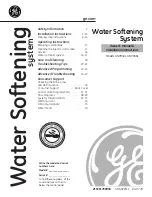
MERLIN LEGEND Communications System Release 5.0
Feature Reference
555-650-110
Issue 1
June 1997
Features
Page 303
Group Calling
SMDR
Calls to calling groups are associated with the first extension to handle
the call. If the call is answered by the calling group delay announcement
device, the extension for the delay announcement device is recorded on
the SMDR record, even if the call is later answered by a calling group
member or overflow group member.
In Release 4.1 and prior systems, timing begins as soon as the calling
group member or delay announcement device answers the call.
In Release 4.2 and later systems, timing for incoming calls to Auto Login
or Auto Logout calling groups begins when a call arrives at the system. If
the caller hangs up while listening to a delay announcement, the call is
associated with the extension of the device.
In Release 4.2 and later systems, the programmable SMDR TALK field
(factory setting is off) records the time agents spend talking to incoming
callers; the agents’ calling groups must be assigned the Auto Login or
Auto Logout group type. Calls answered by a delay announcement
device, calling group overflow receiver, or QCC queue overflow receiver
are reported with blank TALK entries.
Release 4.2 and later systems supply the following additional information
about incoming calls to Auto Login or Auto Logout calling groups,
providing the SMDR Talk Time option is enabled:
■
If a call goes to an overflow receiver, SMDR marks the CALL TAG
field with an ampersand (&).
■
If a call is answered at a non-calling group extension, SMDR puts an
exclamation point (!) in the CALL TAG field.
System Access/
Intercom Buttons
Calls to a calling group ring on SA or ICOM buttons on the telephones of
calling group members. A calling group member who is making or
receiving a call on a Shared SA button is considered unavailable by the
system; the principal owner, however, is considered available and can still
receive calls directed to the calling group.
System
Renumbering
Extensions for calling groups (the factory settings: 770–791, 7920–7929)
are assigned and can be renumbered through system renumbering.
Transfer
A call transferred to a calling group is not returned to the originator but is
handled as any other call received in the calling group. For example, the
system follows the same hunt sequence to locate an available calling
group member, and the call is eligible for a delay announcement if one is
programmed. A calling group member who has a call on hold for transfer
is considered available for a call because transfer hold requires pressing
the Transfer button rather than the Hold button.
















































